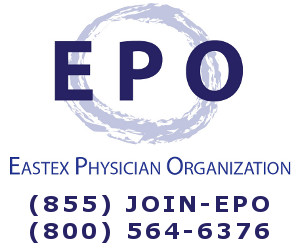Southeast Texas Seniors Diabetes Control & Nutrition Tips from EPO – Eastex Physician Organization
Southeast Texas seniors love the foods we grew up on. For some of us that is chicken fried steak, mashed potatoes, buttermilk pie, and biscuits at every meal. Other Southeast Texas senior citizens grew up on Texas beef: steaks, burgers, and roasts with sides of potatoes and Blue Bell ice cream for dessert.
Sometimes however, our love for the food of our youth, contributes to the onset of diabetes. For those Southeast Texans with diabetes, not modifying our eating habits can definitely make diabetes worse, leading to serious complications.
If you have diabetes, your doctor has talked with you about the importance of good nutrition in helping to control diabetes. Many Southeast Texas diabetics have basically had to learn to eat again.
One group of Southeast Texas Physicians is particularly passionate about giving Southeast Texas diabetics the tools they need to fight diabetes. Eastex Physicians Organization (EPO) is a team of Southeast Texas doctors and medical facilities united to provide the highest quality of care. They are dedicated to helping Southeast Texas diabetics learn to use nutrition to control diabetes and to help with all aspects of your diabetes treatment.

EPO Physicians work together to provide the highest quality of healthcare for Southeast Texas Seniors.
EPO physicians have sponsored some messages designed to assist Southeast Texans in learning to use nutrition as an ally against diabetes.
First, eating properly will you keep your blood sugar levels in the range indicated by your doctor
Secondly, eating properly will help prevent diabetes complications, like heart disease, which is also an issue for Southeast Texans (both those with diabetes and those without).
People who have diabetes don’t need to be on strict diets, but they do need to plan when they eat and often, in Southeast Texas, to adjust what we eat. Cutting down on fried foods, homemade baked goods, and other Southeast Texas staples can be a big help.
Most foods do have healthy (or healthier!) recipes available. You can subscribe to “Cooking Light” or Google “healthy chicken fried steak” or “healthy biscuits”.
Consult Food Labels
Eating appropriately as a Southeast Texas diabetic means knowing what’s in the foods you’re eating. It’s easy to guess what some foods contain, but others are a little trickier. That’s where food labels can be a huge help. Food labels provide a complete list a food’s ingredients, information about nutrition, and of course calories per serving. This nutritional information includes carbohydrates, sodium, and fats, all of which should be tracked by Southeast Texas diabetics.
Carbohydrates
Controlling the amount of carbohydrates a diabetic eats can help you control your diabetes. People with diabetes need to balance the amount of carbs they eat with their levels of physical activity and their insulin intake. Your doctor or a dietitian can help diabetics learn how to do this and will tell you the amount of carbs you should include in your diet. Once you are armed with this information, monitoring food labels will make it easier to track and meet the goals you set with your doctor.
You probably know that some foods contain lots of carbs- French fries, breads, and corn. As you start to monitor food labels, you’ll be surprised at some of the others.
Food labels list carbohydrates in grams. Diabetics can figure out their carbohydrate intake in three basic steps:
- Look on the label for the serving size.
- The label will also tell you for the amount of carbohydrates per serving.
- Calculate how many servings you ate.
For example, a food label might show that the serving size is one half cup and the amount of carbohydrates per serving is 7 grams. If you ate 1 cup of that particular food, you consumed 14 grams of carbohydrates (7 grams of carbs per serving x 2 servings).
Sodium
Southeast Texans with diabetes can also use food labels to measure how much sodium (salt) is in their diets. Some people with diabetes also have high blood pressure (hypertension), and eating too much salt can make it worse. If you have hypertension, your doctor may recommend that you check how much sodium is in the foods you eat. Even if you don’t have hypertension yet, if you are diabetic it’s a good idea to take it easy on sodium.
One trick Southeast Texas diabetics can use for controlling sodium is eating lots of foods you cook yourself- baked or grilled meats, fresh vegetables, and other things from natural ingredients. Most restaurant and prepared food (frozen, canned, boxed) are packed with high levels of sodium.
Fats
Southeast Texans with diabetes are also at greater risk of developing heart disease, especially if they have high levels of lipids (fats) in their blood. Your doctor or dietitian will help determine if you need to limit your intake of saturated fats, cholesterol, and trans fats. Food labels list the amount and types of these fats that a food contains. All of these different kinds of fat can contribute to the development of heart disease in people with or without diabetes.
Aside from carbohydrates, sodium, and fats, Southeast Texas diabetics can review food labels for the same reasons that everybody else does. Watching the calories you eat — and limiting the amount of high-calorie foods that you eat — can help you maintain a healthy weight. It’s also important to make sure that you get enough vitamins, minerals, and fiber to stay healthy.
A quick-reference guide to food content can make choosing healthy foods a little easier if you’re eating out or in situations where there’s no food label. A quick-reference food guide will provide details on the carbohydrate, fat, and sodium content of common foods, along with other important nutritional information. If you don’t have one of these guides, you can get one through your doctor or dietician.
Hopefully this has answered many of your questions about how nutrition can help Southeast Texans manage their diabetes.
East Texas Physician’s Organization (EPO) knows diabetes is a growing problem in our Southeast Texas communities. If you or a loved one would like additional information about diabetes and diabetes control, please call Eastex Physicians Organization: (800) 564-6376.



















